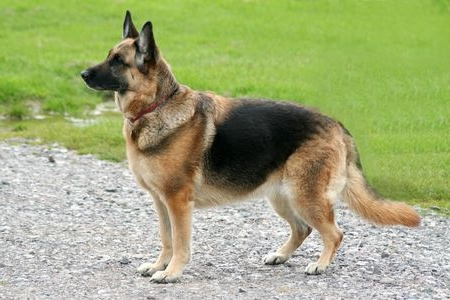
German Shepherds are highly intelligent
Although German shepherds are known for being protective, with the right care and training they are friendly and safe dogs. As strong and muscular dogs, German shepherds are ideal for individuals who love to exercise. These highly intelligent animals have evolved as work dogs, making them ideal for competitions.
Free Quote Form Phone or Email Us
German shepherd stats:
- Life span: Around 13 years
- Colour: Tan with black patches
- Size: Large (35 to 40 kg)
- Training: Strict training requirements
- Coat: Thick, requires daily brushing
- Shedding: Heavy shedders
- Exercise requirements: Moderate to high
Choosing the right German shepherd and exercising them
Both German shepherd bitches and dogs have friendly temperaments, but can also appear a little aggressive. Unlike some other breeds, the males grow to be notably heavier than the females. There can be up to 8 kilograms in difference between the two, which owners may want to consider when choosing their pups.
Until around the age of 12 months – when German shepherds can have hip x-rays to check for congenital problems – free time in the yard is sufficient exercise. Owners may also want to limit outdoor training periods to around 10 to 20 minutes, tapering it up gradually. When they reach 12 months, German shepherds enjoy daily brisk walks and dogs. However, it’s important for owners to initially establish themselves as leaders by making them walk to heel or beside them.
What type of households do German shepherds suit?
While some people associate German shepherds with aggression, this is usually due to poor training as opposed to their nature. It’s possible to keep them in a family home, but owners should also be aware that their dog could become skittish around visiting strangers. This is because they become fiercely protective of owners and those they spend a lot of time around. As sociable animals, they need to spend a lot of time around others. It’s possible to keep them in an apartment, but only with lots of outdoor time. A home with a yard is preferable.
Where to buy your German shepherd
In addition to breeders, you may want to consider the German Shepherd Rescue Trust, as well as police dogs that are no longer in use. Some police forces can no longer use dogs due to health complaints, or because they cannot meet the rigorous demands of police dog training. This is quite rare with German shepherds, as they are naturally intelligent. (Breeders – please contact us to list your website here!)
German shepherd health demographics and disease profiles
German shepherds are quite large dogs, with males reaching 60 to 65cm and females reaching 55 to 60cm.
Although they are very strong and muscular dogs, German shepherds to tend to suffer from joint problems. In addition, they are more likely to experience bloating than many other breeds. Blood disorders are also an issue, including Von Willebrand’s disease, which is a disorder that prevents the blood from clotting efficiently.
Training
Training a German shepherd correctly is essential for making sure they are aware who is the boss in the family, and to ensure they do not become aggressive with strangers. Early socialization is essential to prevent accidents, and so is crate training to stop them chewing. You may have to train a German shepherd more rigorously than other breeds, owing to their intelligence. However, your efforts will be worth it.
If you are looking for a dog that is highly intelligent and fiercely loyal, a German shepherd is for you. Before purchasing, do consider whether you can invest enough time in training your new pup.

